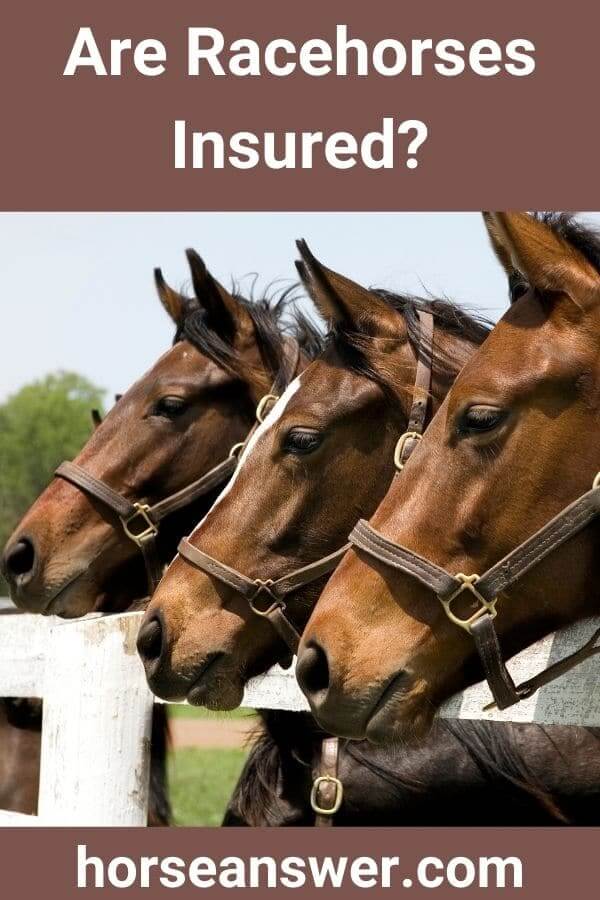Are Racehorses Insured? (Revealed!)
While out at the races with my son the other day, there was a bit of an accident during one of the races and a couple of the horses and riders got a little bit injured.
Nothing serious, fortunately, but he did ask me about who pays for the injuries in the case that something like this does happen.
I’d never owned a racehorse myself, so I had no idea of the ins and outs of it, but my assumption was that they must be insured.
So, I decided to look into it.
So, are racehorses insured?
Racehorses are a business asset to the owners just like anything else, so it won’t surprise you to learn they are insured against injury and death. It’s not a requirement of horse racing to be insured, but for the owners it protects the capital value that they represent.
Just like a car racing team would insure their vehicles or a dog racer might insure their greyhounds, racehorses are generally insured by their owners.
Some of the more prestigious races involve extraordinary amounts of money, so it isn’t surprising that owners insure their horses.
So, let’s look at how the insurance works for racehorses.
Can you insure a racehorse?
You definitely can insure a racehorse, and for many racehorse owners it makes perfect sense.
Most racehorses and yearlings are primarily insured against death in order to protect the capital value they hold.
There are different reasons one might own a racehorse, and that can affect whether or not insurance is needed.
For many people, raising and racing horses might be their whole business.
In that case, having insurance on the horses is absolutely necessary.
It’s no different from insuring a car, in that case.
It’s about protecting your assets and giving yourself financial reassurance.
Because racehorses value can be very volatile, insurance policies usually allow you to amend the sum at any time.
Typically, racing horses means travelling long distances to international races too, and insurers will usually cover you anywhere in the world.
So, you definitely can get insurance on a racehorse.
But is it absolutely necessary?
Do you need insurance on a horse?
Having your horse insured is certainly not a legal requirement, like insuring your car.
It may be a bit different for workhorses that are ridden on roads with other cars.
But for racehorses, there’s certainly no legal requirement to have it insured.
The law doesn’t directly involve itself in the business of racing in this way.
Racetracks, also, do not usually require you to insure your horse.
They have other methods in place for ensuring smooth resolutions of these types of issues.
It won’t be a requirement to insure your horse before going out onto the track.
However, there are many reasons you should really insure your horse.
Obviously, in any race, your horse stands a chance of being injured; it also stands this chance off the racetrack, too.
If your horse becomes injured, it can be very expensive to treat.
Furthermore, if your horse becomes injured without insurance, it’s unlikely any policy will take you on at that point.
Ultimately, you need to be protected against all the financial burdens potentially associated with owning a horse, so we would advise you do insure your horse.
Can you insure a mature horse?
Racehorses typically don’t race for a lot of their life.
Quite quickly, horses become mature and don’t race anymore.
There are still many reasons to insure a mature horse, though, and you certainly can do it.
Indeed, insurance on mature horses is likely to be cheaper, depending on what you’re using the horse for.
Often, when a successful horse retires from racing, it is sent to a farm as a breeding horse.
Their chances of injury here are much lower, but still existent.
Further, with insurance you aren’t just protecting against injury.
You’re also protecting against theft.
Breeding stallions and mares are big targets for horse thieves as they’re still worth a lot of money.
Insuring a mature horse will give you full protection against anything that could go wrong.
How much are horses insured for?
As I said, the value of a racehorse can change after every race, so it’s difficult to put a figure to it.
For mortality coverage, on average, you can expect to pay premiums of anywhere from 2.5 to 4% of the horse’s value.
So, to insure a horse valued at $7,000 would be an annual premium of around $250.
However, that can always change race to race, as horses perform better or worse.
If your horse is consistently doing very well, you will want to raise your premiums and insure it for a greater amount.
If it’s not doing so well, you can reduce the premiums, and have it covered for less.
There’s a great deal of money in the horse racing industry, so it’s no surprise that the insurance industry has moved in to provide a necessary service.
Especially with a live animal for whom much more can go irreparably wrong than, say, a car, having protection for your asset is absolutely essential if it is very valuable.
This is what racehorses are to their owners; a capital investment that requires protection against death and injury.
